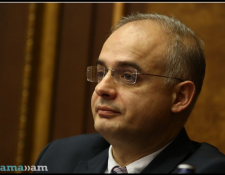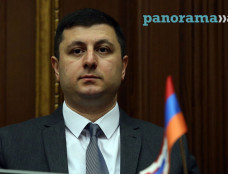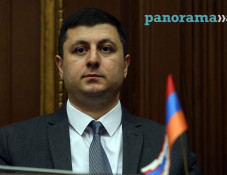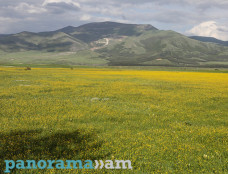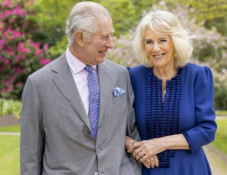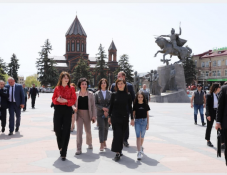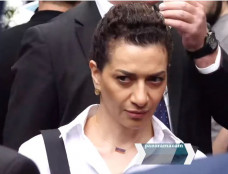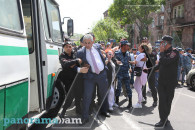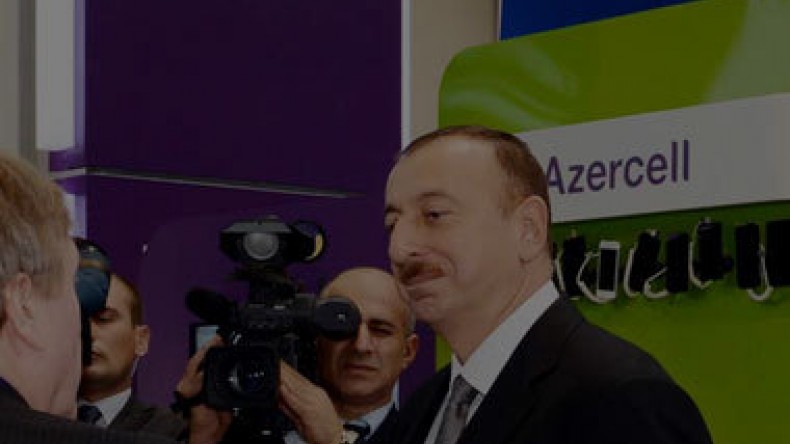
Details of TeliaSonera offshore scandal revealed: Aliyev clan stole US$ 600 million from Azerbaijanis
Taxpayers in Azerbaijan lost more than US$ 600 million in a deal that made no sense for all involved except for a murky offshore deeply connected to President Ilham Aliyev. A company close to Azerbaijani President Ilham Aliyev and his clan likely walked off with more than US$ 1 billion in a takeover of his country’s stake in Azercell Telecom, the largest mobile operator in the country. The process was aided by a subsidiary of TeliaSonera, the Swedish-Finnish telecom giant, which acted against its own interest to allow the deal to happen, according to the findings documented by the journalists from The Organized Crime and Corruption Reporting Project (OCCRP). The report is published on OCCRP website.
According to the report, TeliaSonera, which owns a majority share of Azercell, turned down dividends in order to placate the government of Azerbaijan. In exchange, Azercell would receive all required regulatory approvals and licenses necessary to operate in Azerbaijan, according to internal documents. The deal was considered to be possibly the largest bribery in Swedish history.
Einar Hackner, an experienced auditor and professor emeritus in business administration at Mid Sweden University who reviewed the reporters’ findings, told OCCRP reporters the government assets have likely been stolen.
After TeliaSonera was revealed to have paid bribes to a member of the ruling family of Uzbekistan, new CEO, Johan Dennelind, was hired. When asked directly whether TeliaSonera bribed the Aliyev regime, Dennelind, said, “We cannot prove it. But we cannot rule it out.”
OCCRP says Azercell was established in January 1996 as a joint venture between the Azerbaijani government and Turkcell, a leading mobile phone operator of Turkey. The Azerbaijani government owned 51 percent of the new mobile carrier. Faced with the difficulties of operating in a country considered among the most corrupt in the world, Turkcell later that year brought in a new partner: the Istanbul-based Cenay Insaat (Cenay Construction), which is part of a group of related companies known as the Cenay Group. The Group is owned by the Guldamla family who had established a good relationship with Azerbaijan’s ex- president Heydar Aliyev, the father of the current president Ilham Aliyev. The relationship continued after Heydar Aliyev’s death in 2003, and Cenay officials would sometimes appear at special occasions with the new president. Their financial success is largely due to their various businesses in Azerbaijan, which include fiber optics, oil and natural gas.
According to the report, together they formed an Istanbul-based holding company called Azertel and Turkcell moved its ownership share of Azercell into this new company. Azertel, through a recapitalization, later increased its stake in Azercell to 64.3 percent while the government’s stake decreased to 35.7 percent. In 2000, Turkcell merged most of its international holdings, including Azertel, with assets from the Finnish telecom operator Sonera into a Dutch-based company called Fintur Holdings. Turkcell received a minority stake in the new company. Sonera merged two years later with the Swedish operator Telia to become TeliaSonera. Through its majority in Fintur, TeliaSonera gained management control over Azercell. From the beginning Azercell profits and taxes were a major contributor to Azerbaijan’s state budget. But in 2008, when the company started to really earn big profits, the state’s share was quietly shifted to companies linked to the clan of the President Aliyev.
At the end of 2003, Azercell had just reached the 1 million subscriber mark. The company was the second biggest taxpayer after SOCAR, the state oil company, and had just distributed profits of US$ 31.5 million. In 2004, Farhad Aliyev, then the Minister of Economic Development of Azerbaijan, told Erdal Durukan, the CEO of TeliaSonera’s Dutch holding company, of a plan to privatize the government shares in Azercell. Durukan presented a privatization plan to his board of directors. TeliaSonera planned to increase its indirect ownership in Azercell from 51 to 75 percent, giving it full management control of the company. While the government of Azerbaijan valued the company at between US$ 400 and 550 million, TeliaSonera’s valuation was higher -- between US$ 600 and 700 million. During the negotiations, the maximum cost TeliaSonera was willing to pay was US$ 200 million, according to the reporters’ findings.
But six months later, in September 2004, a new player entered the game. With no explanation, the government of Azerbaijan informed TeliaSonera that the Swedish-Finnish telecom could not privatize Azercell by itself. Instead, Cenay Insaat and a new government-approved local partner would privatize the share. TeliaSonera would have to waive its right to buy the government shares and agree to finance Cenay Insaat and the new local partner with a US$ 100 million loan. At no point did the executives explain the sudden shift of strategy or even reveal the true identity of the local partner, the journalists say.
In exchange, the mysterious local partner guaranteed it would get all necessary licenses and regulatory approvals and that the government would pass laws liberalizing the telecom industry. “Such a sweeping commitment could only be delivered by the government itself or a highly placed government official,” the authors of the report conclude.
According to the findings, TeliaSonera wanted to maintain corporate control over Azercell’s holding company, and appoint all board members. The local partner would have the right to nominate one board observer. But the local partner wanted more management control, something TeliaSonera was unwilling to concede. The pushback by TeliaSonera was followed by the government shelving the proposed sale of the state stake without giving any reason for the change in plans. Azercell suddenly found itself under pressure from state regulatory bodies, and tax authorities – a familiar practice for corrupt regimes.
The scheme took a new twist in the spring of 2005, when a new and equally murky local partner put privatization back on the agenda. Azercell’s shares would now to be shifted to a company, Cenay Iletisim (Cenay Communications), established by two of Cenay Insaat’s founders. Less than a month later, Cenay sold its interest in Cenay Iletisim to two Panamanian shell companies that had been newly incorporated. The authors of the report managed to reveal the details of this “Trojan horse” transaction, which indicate Azerbaijan’s ruling clan was involved. The Aliyevs had registered most of the clan’s offshore companies in Panama. The deal was registered by the agent, Morgan y Morgan, normally used by the clan. Cenay Iletisim was represented by long-time Aliyev clan proxy Olivier Mestelan, a Swiss lawyer who was the signatory of other companies set up by the clan. The director of the company is Ahmet Cemhan Bilge, a Turk whose construction company is the main contractor for Aliyev clan.
The reporters highlight that the deal made no commercial sense. The new Panamanian controlled partners bought Cenay Iletisim (and thus 6.5 percent of Azercell) for just US$ 6.5 million - a substantial discount to market value. When a reporter from OCCRP asked Cenay Group’s Ugur Uzpeder if they were forced to sell their share for so little, he answered that he could not say anything.
In mid-December 2005, TeliaSonera was given the same choice by the government that it had fought a year earlier. Azertel as the holding company had to come up with US$ 180 million to buy the government’s share. For the privatization to work like the government wanted it to, TeliaSonera and Cenay Insaat would have to willfully refuse their rights to participate in the recapitalization which gave them the advantage to increase their stake in Azercell during the privatization. Cenay Iletisim, the company close to the President, would gain a much bigger slice of the ultimate pie, as the reporters have it.
TeliaSonera had no other choice. It approved the deal because otherwise the government would find another client. After the privatization Cenay Iletisim would indirectly own 42 percent of Azercell (up from 6.5 percent), TeliaSonera 51 percent (down from 80 percent) and Cenay Insaat 6.5 percent. To add insult to injury, TeliaSonera and Turkcell were expected to loan Cenay Iletisim the money it needed to buy the shares. On Feb. 12, 2008, TeliaSonera announced that Azertel had reached an agreement to purchase the Azerbaijan government’s 35.7 percent stake in Azercell. The deal closed April 1, 2008.
“While the deal was a bad one for TeliaSonera and its partners, it was and an even bigger disaster for the people of Azerbaijan. First, the purchase price set by the government was ludicrously low. In April 2008 when the government’s stake in Azercell was finally sold to Azertel, Azercell was worth US$ 2.2 billion. That means that the state’s interest – according to TeliaSonera itself – was worth US$ 785 million, and not the meager US$ 180 million the government sold it for,” the report reads.
Hackner, the business professor, adds that the mysterious purchasers did not have to invest any of their own resources. “It did not cost them a cent. But it did cost people of Azerbaijan. They lost US$ 600 million in the process,” he said. Yet the reporters revealed that people of Azerbaijan did not even receive all of the US$ 180 million. The transaction was a win-win deal for those closely connected to the Azerbaijani ruling elite.
According to the report, Cenay Iletisim would have the right to sell their 42 percent stake back to TeliaSonera at a fair value at some future date – potentially a US$ 1 billion transfer of wealth.
When this all happened, Azercell initially expected to receive permission to use the newest technology, at the time a 3G license. One of its competitors, owned by the President’s clan, had a 3G license. Three-years later, a license finally appeared in late 2011, and like previous licensing deals, it came in the wake of another hidden reshuffling of Azertel’s ownership.
In November, 2011, TeliaSonera, Cenay Insaat and Cenay Iletisim gathered for their annual general meeting and approved the results of the fiscal year, but the Board declined to distribute dividends for unknown reasons. A month later, the Board again met and did an about face on distributing dividends. But the shareholder that ultimately received 6.5 percent of the dividends was not Cenay Insaat, but a previously unknown shell company, FA Invest Malta, which has been incorporated just five weeks earlier and was represented by Hamzayev Rashad Firidunoglu.
Coincidentally, one of the president’s personal security guards in the Special State Guard Service has the same name. Only after this did Azercell finally receive its long-awaited 3G license, and shortly thereafter, a 4G license, the authors of the report write.
Hackner, an experienced auditor, told the investigative journalists that everyone who participated had to know this new company was in fact controlled by someone very powerful. “I find it impossible that TeliaSonera does not know. The worst thing to do is to sweep something under the carpet and hope it does not show up,” said Hackner.
Related:
Newsfeed
Videos





